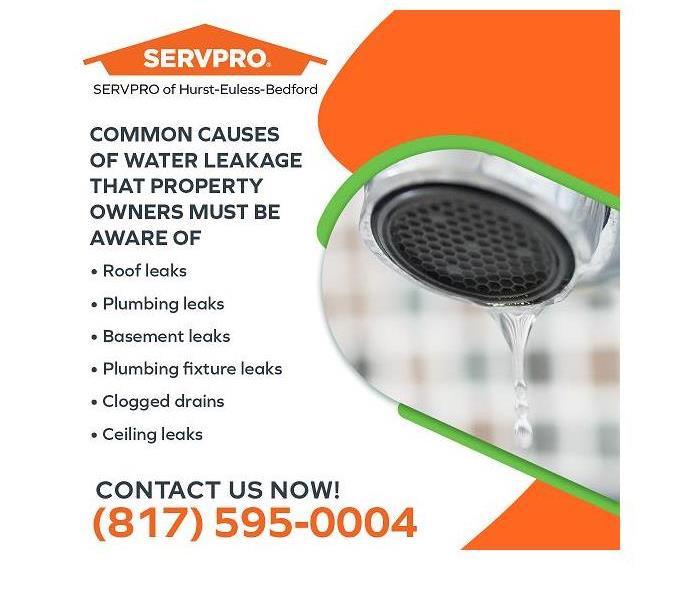SERVPRO points out the common culprits behind water leakage in commercial spaces
3/28/2022 (Permalink)
Blog summary: The blog by SERVPRO talks in detail about the common causes of water leakage in commercial buildings. The blog also highlights how an unaddressed water leakage can cause huge economic losses to a business.
What causes water leakage in commercial buildings?
The volume of water usage in commercial and residential buildings varies enormously. With the high water bills in commercial buildings, a water leakage that goes undetected can prove to be very costly. SERVPRO shares the common causes of water leakage that property owners must be aware of.
- Roof leaks
Roof leaks can threaten the structural integrity of a building and give way to major water leaks that entail major restoration costs.
- A disrupted drainage system: When drainage systems fail, only a commercial roof repair contractor can address the standing water and address the situation.
- Damaged flashing: As temperatures fluctuate, the fashing expands and contracts and undergoes as the roof disintegrates.
- Weakened roofing membranes: A seal that protects the inside of a building against moisture, roofing membrane must be replaced as it often splits, blisters, cracks, or shrinks.
- Damaged shingles: High winds can misplace, break or blow away shingles, allowing water to seep into the building and cause severe damage.
- Ice dams: When the snow melts and is unable to drain off the roof due to the ridges of ice at the roof edges, it eventually permeates the building causing damage. These ridges of ice are called ice dams and must be addressed at the earliest.
- Gas lines, HVAC units, vents, drains, and pipes: These important elements are often found on rooftops and in the absence of adequate securing can cause leaks inside the property.
Installing rain collars, flashing, pipe boots, and field wraps can help avoid these leaks.
- Plumbing leaks
Water pipes inside the walls of commercial buildings and underground can also be a source of leaks.
- Burst pipe: Aging pipes get cracked or corroded leading to burst pipes and extensive water damage.
- Appliance hose rupture: Washing machines, dishwashers, and air conditioning units have hoses that often leak due to general wear and tear. Regular inspection and maintenance ensure there are no leaky surprises.
- Sprinkler activated: Fire-suppression sprinklers must be checked and maintained to ensure they do not malfunction and get activated even when there is no fire.
- Frozen pipes: Pipes often leak during winters as they freeze in the low temperatures. Notably, a 1/8-inch crack in a pipe can release up to 250 gallons of water a day. This can cause massive damage.
Regular maintenance of the plumbing system is crucial to keep such water damage events at bay.
- Basement leaks
Even minor foundation leaks can lead to floods and structural damage due to poor waterproofing systems, inferior concrete quality, defects or damage to the waterproofing membrane, or insufficient grading.
The failure to waterproof the basement allows moisture from clogged drainage, broken pipes, rising groundwater levels, and landscaping water elements to seep in. The combination of the chloride content of concrete and moisture can threaten the structural integrity of the basement.
- Plumbing fixture leaks
Plumbing fixtures in commercial buildings experience major overuse and therefore a lot of wear and tear. From leaking faucets due to worn-out rubber washers to toilet leaks caused by a failed flapper and fill valve, commercial buildings are prone to major plumbing leaks if not maintained regularly.
- Clogged drains
Commercial kitchens and toilets often struggle with clogged systems and slowed drainage due to improper or excessive disposal of waste and other debris down the drains. The clogged systems eventually back up and cause severe water damage events.
- Ceiling leaks
Property managers must keep an eye out for tell-tale signs of water damage such as damp patches and musty smells. Failure of waterproofing membranes in bathrooms and other wet areas of high-rise buildings can lead to water damage as well as secondary water damage called mold growth.
Install Leak detection Systems
These water leaks in a commercial space can be prevented by installing passive or active water leak detection systems. The common systems used by commercial buildings are Wireless water leak detectors, Cloud-based sensors, and Automated sensors.
Why SERVPRO?
- SERVPRO uses state-of-the-art equipment to bring the damaged property back to its original state. SERVPRO of Hurst-Euless-Bedford is always updating its fleet and equipment so clients in Hurst, Euless, Bedford, or anywhere else can quickly access the services.
- With over 1,700 US and Canadian Franchise locations, SERVPRO is strategically positioned to respond faster to an emergency of any magnitude.
- The SERVPRO staff is highly trained in property damage restoration. They receive initial in-house training and constant skill up-gradation at the corporate training facility and also acquire the regular IICRC-industry certification.
For commercial cleaning services, contact Team Shaw of SERVPRO of Hurst-Euless-Bedford today at (817) 595-0004 or e-mail at office@SERVPROheb.com






 24/7 Emergency Service
24/7 Emergency Service
